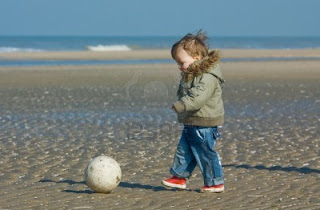 Sporting skills and enjoyment learned in childhood build foundations for enjoyment of sport throughout life. Sport is a way of making exercise an enjoyable and social event.
Sporting skills and enjoyment learned in childhood build foundations for enjoyment of sport throughout life. Sport is a way of making exercise an enjoyable and social event.Children and young people who play and enjoy sport are less likely to join in anti-social activities. If children have a disability or ongoing medical problem there are many sports they can play. Discuss this with your child's doctor and then find out what is available in your area.
If children are started in competitive sport before they are emotionally or physically ready they are likely to experience disappointment and stress and may give up playing altogether.
Young children
* Children under 8 need to have the freedom to play, explore and learn the skills of throwing and catching, kicking and hitting a ball, jumping, running and swimming in an enjoyable way.
* It is having these skills that enables them to confidently move on to the next step.
* Parents can play an important role in playing games with children that help them to learn these skills in an enjoyable way without pressure. For example kicking a ball to each other in the backyard or park, throwing a ball through a hoop, or playing bat and ball games where everyone has a turn and the scores are not counted. Children need lots of practice at doing well before they can learn to lose. See the topic 'Winning, losing and cheating'.
8-10 year olds
* Depending on their individual development 8-10 year olds can join in organised competition (eg inter-school competition) that is adapted to meet the children's developing needs.
* They will still need help with skill development and with coping with disappointment.
* Children who lose too often are most likely to give up, so making sure that each child has some successes is important.
* This is a time when children can try lots of different sports to see what they enjoy most.
11-12 years and over
* Children and young people can enjoy the competition and still be learning skills.
* Some children at this age are showing special talent at and interest in a particular sport and can benefit from individual coaching.
* Children and young people need to learn about how to behave when playing, and when winning and losing.
* Sport at this stage can involve trips away with a team and opportunities for team leadership.
* It is important not to push any young people beyond what they are physically ready for and to find out about what is appropriate in relation to their age and the sport they are playing.
* For young people who want to drop out of competitive team sport, activities such as bush walking, orienteering, gymnastics (or exercise classes at the local gym), roller-skating or horse riding may take their place. See the topic 'Physical activity for children'.
article from http://www.cyh.com
image from 123rf.com



